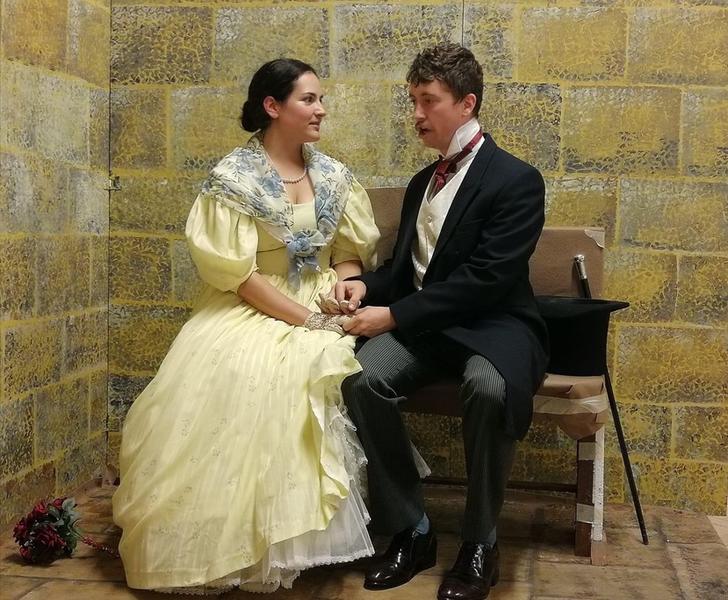Madeleine review
Guy Ricards in Critics Circle , 6 October 2021

Kelly Glyptis, in the title role, and Thomas Kelly as her lover Emile, in 'Madeleine'
Surrey Opera is a semi-professional company, founded in 1969. Like many similar companies around the country, they offer a platform for young and aspiring singers. Unlike those companies, Surrey Opera have, to celebrate the fiftieth anniversary of their inaugural production (The Magic Flute) in 1970, commissioned a brand new, full-evening opera in three acts from a composer with no previous operatic track record (beyond the electronic score for Qo’noS chal VeS, set in Klingoni)! The lockdown caused the première to be postponed by a year, until an initial run of three performances at the Harlequin Theatre, Redhill.
Madeleine was composed in just three months by David Hackbridge Johnson (b1963; a hugely prolific composer with some six hundred works to his credit, including fifteen symphonies, four of which have been released by Toccata Classics) during 2019-20 to a libretto created by Jonathan Butcher, who also conducted the première. It is based on a true story, scandal even, from Glasgow in the 1850s: the alleged murder by arsenic poisoning of the Jersey-born Emile L’Angelier. The accused was his 22-year-old lover, Madeleine Hamilton Smith, daughter of a successful architect and granddaughter of the father of Scottish architecture, David Hamilton. The story has been treated previously in several books, TV plays and in a 1950 David Lean film.
Butcher’s and Hackbridge Johnson’s opera charts the course of the affair between Madeleine and Emile, and the consequences of his death (towards the close of Act 2). The First Act alternates between their illicit rendezvous in Madeleine’s basement and the Smith family’s outward conventionality, with Madeleine’s father setting up a prospective marriage to a wealthy neighbour, William Minnock. However, after Madeleine’s and Emile’s love is consummated in the garden of the Smith country house, the affair sours as Madeleine’s father pressures her into the marriage with Minnock. Desperate, she pleads with Emile that they elope to London and marry; he, however, refuses on the grounds that this is dishonourable (a qualm of conscience that had not coloured his conduct in the garden!), so Madeleine breaks off the relationship. At a grand ball at the end of Act 1, she accepts Minnock’s proposal.
Act 2 leads inexorably to disaster as Emile, unable to accept Madeleine’s rejection, blackmails her into continuing the affair by threatening to show her passionate letters to her father. His goal is respectability, to enter the house by the front door as a gentleman, not clandestinely through the servants’ entrance. His persistence is his undoing, and twice he returns to his lodgings violently ill: on the latter occasion expiring due to arsenic poisoning, allegedly administered in a cup of cocoa. Act 3 relates Madeleine’s arrest and trial before a polarized public. In a cleverly constructed final scene, the arguments of the two counsels are related – with flashbacks of the key witness testimony – before the verdicts are delivered: Not Guilty and Not Proven to the two charges.
Hackbridge Johnson’s dramatic pacing is on the mark throughout, the music slowly changing tone as events turn from the light and hope of the outset to darkness and tense drama in the second and third acts. Hackbridge Johnson’s style is tonal and entirely his own, though inevitably there are resonances of other modern operatic composers such as Britten and Detlev Glanert. A key point occurs early in Act 2, after two revealing scenes: the passionless duet of Madeleine and Minnock (in stark contrast to the intensity of those with Emile in Act 1), and Emile’s and his friend Thuau’s light-hearted paean to love following his coercion of Madeleine. A soft dissonant chord built of sixths in the strings seems to dominate the Act, even when it is not sounding, at odds with the surface melodic and harmonic flow of the scenes, like the presager of disaster.
Surrey Opera’s production was a triumph, especially for a provincial semi-professional company during a continuing pandemic. In the title role, Kelly Glyptis, Grand Prix winner of the 2021 Musical International Grand Prix for Adult Classical Voice, was undeniably star of the show, her strong soprano never overwhelmed by the vivid orchestration, unlike one or two colleagues who struggled in places, and her portrayal was as complex as Madeleine was conflicted. Thomas Kelly made an admirable foil as the besotted, status-conscious Emile, though for ramrod Victorian sensibility there was no beating the robust-voiced Edwin Kaye as Madeleine’s father; in a nice touch, he doubled in Act 3 as the Trial Judge. The remainder of the cast were mostly fine, none poor (despite some over-reliance on vibrato). The chorus – often doubling as sceneshifters of the cleverly modular rotating set – were splendid in the various roles as Scottish country revellers or partisan crowds outside (and inside) the courtroom. The 33-member Surrey Opera Orchestra, superbly marshalled by Butcher, contributed immensely, particularly in the many interludes that drive the action along during the rapid scene changes, augmented in Act 3 with the composer as an uncredited percussionist. The costumes were nicely of the period and if the lighting was straightforward, it was nonetheless effective.
The opera is to be revived by the company for a second run in 2022.